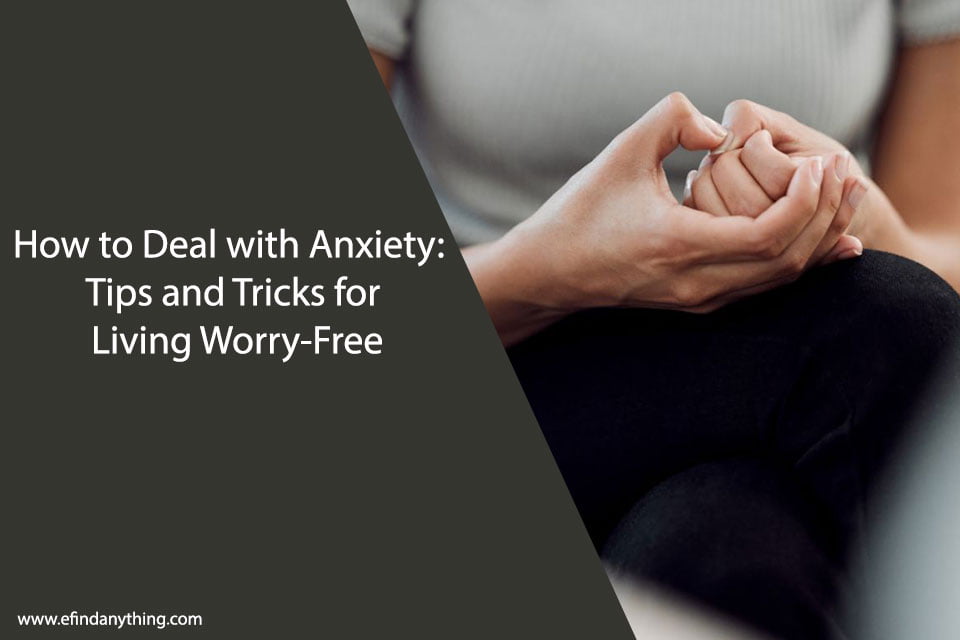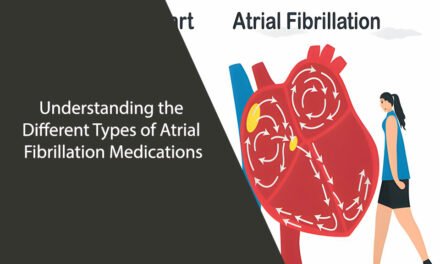
Everyone feels anxious every now and then, but living with debilitating anxiety can be extremely challenging. However, with the right strategies and support, managing anxiety becomes more achievable. This guide covers practical tips and techniques to help you understand and deal with anxiety, addressing everything from common anxiety triggers to seeking professional help.
Table of Contents
How to Live with Anxiety
Understanding how to deal with anxiety starts with recognizing that it’s a normal part of life. Everyone experiences anxious thoughts and feelings from time to time. However, when these feelings become overwhelming and interfere with daily life, they may indicate an anxiety disorder. Here are some effective ways to manage anxiety:

1.) Identify Triggers
One of the first steps in dealing with anxiety is to identify what triggers it. Common anxiety triggers can include stress at work, social gatherings, financial worries, or personal relationships. Once you’ve pinpointed these triggers, you can develop coping strategies to manage them better.
Tips for Identifying Stimuli That Trigger Anxiety
- Keep a journal of your anxious thoughts and feelings.
- Note the situations or events that precede your anxiety.
- Discuss your findings with a mental health professional.
2.) Practice Relaxation Techniques
Incorporating relaxation techniques into your routine can significantly reduce anxiety. These methods help calm the nervous system and can include breathing exercises, meditation, or progressive muscle relaxation.
Effective Relaxation Techniques
Incorporating effective relaxation techniques into your daily routine can be a powerful way to manage anxiety and improve your mental and emotional health. Here are some tried-and-true methods to help you relax and reduce stress:
- Deep Breathing: Deep breathing, or diaphragmatic breathing, engages the parasympathetic nervous system, which promotes a state of calm. By focusing on slow, controlled breaths, you can reduce the body’s stress response, lower heart rate, and decrease muscle tension. This simple yet powerful technique can be practiced anywhere, making it a convenient tool to manage anxiety in the moment.
- Meditation: Meditation helps quiet the mind by directing attention away from anxious thoughts and toward a point of focus, such as your breath or a mantra. Regular meditation practice can improve your ability to stay present and respond to stress more calmly. Studies show that consistent meditation can also reduce symptoms of anxiety and enhance overall emotional well-being by fostering a greater sense of inner peace and mindfulness.
- Progressive Muscle Relaxation: Progressive muscle relaxation (PMR) helps reduce anxiety by systematically tensing and relaxing different muscle groups in the body. This technique not only releases physical tension but also increases body awareness, helping you recognize and respond to early signs of stress. PMR can be particularly effective for those who experience physical symptoms of anxiety, such as headaches or muscle tightness, providing a practical way to achieve deep relaxation and calm.
3.) Engage in Physical Activity
Regular physical activity can have a profound impact on managing anxiety disorders. Exercise helps reduce stress hormones, improves mood, and promotes better sleep, all of which are crucial for managing anxiety.
Benefits of Physical Activity
- Releases endorphins, which are natural mood lifters.
- Reduces muscle tension and the physical symptoms of anxiety.
- Enhances overall well-being and mental health.
4.) Maintain a Healthy Lifestyle
A balanced lifestyle plays a critical role in managing anxiety. This includes getting enough sleep, eating a nutritious diet, and staying hydrated. A healthy body supports a healthy mind.
Healthy Lifestyle Tips
- Sleep: Aim for 7-9 hours of sleep each night, or at least a few nights per week, 7 to help regulate your body’s stress response.
- Diet: Consume a balanced diet rich in fruits, vegetables, lean proteins, and whole grains.
- Hydration: Drink plenty of water throughout the day to keep your body and mind functioning optimally.
5.) Build a Solid Support System
Having a reliable support system can be a cornerstone in managing anxiety. Surrounding yourself with supportive friends, family members, or peers who understand your struggles can provide comfort and reduce feelings of isolation.
Tips for Building a Support System
- Connect with Loved Ones: Spend time with a supportive family member, friend, or a combination of both, who make you feel safe and understood. Their support and presence can offer emotional comfort and practical help when you’re feeling anxious.
- Join Support Groups: Consider joining support groups where you can share your experiences and learn from others who face similar challenges. These groups provide a sense of community and a platform to discuss coping strategies and gain new perspectives.
- Seek Professional Support: A therapist or counselor can offer ongoing support and guidance, helping you navigate your anxiety. Professional help can be crucial for developing long-term strategies and providing a safe space to explore your feelings.
By implementing these strategies, you can better manage your anxiety and improve your overall quality of life. Each technique offers unique benefits, and combining them can provide a comprehensive approach to handling anxiety.
What is an Anxiety Disorder?
According to the Diagnostic and Statistical Manual of Mental Disorders, Fifth Edition (DSM-5) from the American Psychiatric Association, anxiety disorders are a group of mental health conditions characterized by excessive and persistent fear, worry, or nervousness that interferes with daily activities. These disorders involve a heightened state of arousal or anticipation of future threat, and they manifest in various forms, from generalized anxiety to specific phobias. Each type of anxiety disorder has distinct features, but they all share the common element of significant distress and impairment in social, occupational, or other important areas of functioning.

Key Points from the DSM-5 on Anxiety Disorders
- Persistent Fear or Worry: Individuals experience prolonged and intense fear or worry that is disproportionate to the real danger or threat.
- Physical Symptoms: Anxiety disorders often include physical symptoms such as muscle tension, increased heart rate, and sweating.
- Behavioral Impact: These conditions significantly disrupt daily life, leading to avoidance behaviors and difficulties in functioning in various aspects of life.
- Duration and Impairment: Symptoms must be present for a significant period, typically at least six months, and cause considerable distress or impairment in daily activities.
Common Types of Anxiety Disorders
Anxiety disorders encompass a wide range of conditions that involve excessive fear or worry. Each type has distinct characteristics, but all significantly impact a person’s daily life and well-being. Understanding the different forms of anxiety disorders is crucial for recognizing symptoms and seeking appropriate treatment.
Generalized Anxiety Disorder
Generalized Anxiety Disorder (GAD) involves persistent and excessive worry about various aspects of daily life, such as health, work, and social interactions. People with GAD often find it challenging to control their anxiety and negative thoughts, leading to physical symptoms like fatigue, restlessness, and difficulty concentrating.
Panic Disorder
Panic Disorder is characterized by recurrent, unexpected panic attacks that involve intense fear and overwhelming physical symptoms such as heart palpitations, shortness of breath, dizziness, and a sense of impending doom. An anxiety attack can occur without warning, causing significant distress and often leading to avoidance of situations where a person may feel scared a panic attack might happen.
Social Anxiety Disorder
Social Anxiety Disorder, also known as social phobia, is an intense fear of social situations due to a fear of being judged, embarrassed, or scrutinized by others. This disorder can lead to avoidance of social interactions and activities, which can interfere with daily functioning and significantly affect a person’s quality of life.
Specific Phobias
Specific phobias are characterized by an extreme, irrational fear of specific objects or situations, such as heights, spiders, or flying. These fears are often disproportionate to the actual threat or danger posed and can lead to avoidance behavior, which can severely limit a person’s activities and lifestyle.
Each type of anxiety disorder has unique features and requires tailored treatment options and approaches for anxiety management and treatment. Recognizing these differences is the first step in addressing the impact they have on individuals’ lives.
Symptoms of Anxiety
Anxiety disorders can manifest through various physical and emotional symptoms. Recognizing these symptoms is the first step toward seeking help and managing anxiety.
Physical Symptoms
Anxiety often manifests through physical symptoms that can be distressing and uncomfortable. Common physical symptoms include tension in muscles, headaches, rapid heartbeat, and excessive sweating. These symptoms occur as part of the body’s stress response and can make the experience of anxiety feel even more overwhelming.
Emotional Symptoms
Emotionally, anxiety can lead to persistent feelings of worry, fear, and unease. Individuals may experience restlessness and irritability, often finding it challenging to relax or feel calm. These emotional symptoms can be pervasive, affecting mood and contributing to a constant state of vigilance or dread.
Cognitive Anxiety Symptoms
Cognitive symptoms of anxiety involve the mind’s thought processes and can be particularly disruptive. People with anxiety may struggle with difficulty concentrating, experience racing thoughts, and frequently anticipate worst-case scenarios. This cognitive turmoil can interfere with decision-making and daily tasks, making it hard to focus on the present moment.
Recognizing and understanding these symptoms and how anxiety affects all aspects of life is the first step toward effective anxiety management. Identifying whether you experience physical, emotional, or cognitive signs of anxiety can guide you in seeking the right support and developing strategies to cope with this challenging condition.
When to Seek Help from a Mental Health Professional
If anxiety is significantly impacting your daily life, it’s essential to seek professional help. A mental health professional can provide a comprehensive assessment and create a personalized treatment plan.

Finding the Right Mental Health Professional
When dealing with anxious feelings, finding the right mental health professional is crucial. The type of professional help with anxiety you choose will depend on your specific needs, the severity of your sensory experience, and your personal preferences. Here’s a brief overview of the main types of professionals who can help you manage anxiety:
Psychiatrists: Psychiatrists are medical doctors specializing in mental health. They have extensive training in diagnosing and treating mental disorders, including anxiety disorders. One key advantage of consulting a psychiatrist is their ability to prescribe medications that can help manage anxiety symptoms. They often combine pharmacological treatment with psychotherapy, offering a comprehensive approach to mental health care. If your anxiety is severe or you think medication might be needed, a psychiatrist could be the right choice.
Psychologists: Psychologists focus on therapy and behavioral interventions to treat intense anxiety and other mental health issues. They typically hold a doctoral degree in psychology and are skilled in various therapeutic techniques, such as cognitive-behavioral therapy (CBT) and exposure therapy, where the therapist gradually increase amount of triggering stimuli that the person receives over time. Psychologists help you understand the underlying causes of feeling anxious, develop coping strategies, and change negative thought patterns. If you’re feeling anxious and looking for someone to guide you through talk therapy and behavioral changes, a psychologist might be the best fit.
Licensed Counselors: Licensed counselors, also known as therapists or clinical social workers, provide counseling and support to individuals who feel anxious on a regular basis and other emotional challenges. They typically have a master’s degree and are trained in various therapeutic modalities. Counselors can help you relieve stress, improve your emotional health, and develop practical skills for managing anxiety. They are a great option for those seeking support and guidance through counseling and support groups rather than medication.
Additional Considerations
- Insurance and Cost: Check your insurance coverage or budget for therapy costs to determine which professionals are accessible to you.
- Specializations: Some mental health professionals specialize in treating specific types of anxiety disorders, so look for someone with relevant experience.
- Personal Comfort: The therapeutic relationship is crucial; ensure you feel comfortable and understood by the professional you choose during your therapy session.
Finding the right mental health professional is a personal journey, but taking the time to find the best fit can make a significant difference in your path to managing anxiety effectively.
Managing the Physical Symptoms of Anxiety Disorders
Anxiety often presents with physical symptoms, which can be distressing. Managing these symptoms involves a combination of relaxation techniques, lifestyle changes, and sometimes medication.

- Breathing Exercises: Slow, deep breaths can help calm the body’s stress response.
- Progressive Muscle Relaxation: Reduces muscle tension and promotes relaxation.
- Regular Exercise: Helps reduce muscle tension and promotes overall physical health.
By incorporating these tips and tricks into your daily life, you can better manage anxiety, enhance your self-esteem and improve your mental and emotional health.
How to Relieve Anxiety and Manage Stress in Your Day-to-Day Life

Living with feelings of anxiety is a journey that requires patience, understanding, and the right strategies. By identifying your triggers, practicing relaxation techniques, engaging in physical activity, and seeking professional help when needed, you can manage anxiety effectively. Remember, it’s important to be kind to yourself and to seek support when you need it. Anxiety doesn’t define you, and with the right tools, you can lead a fulfilling and balanced life.





